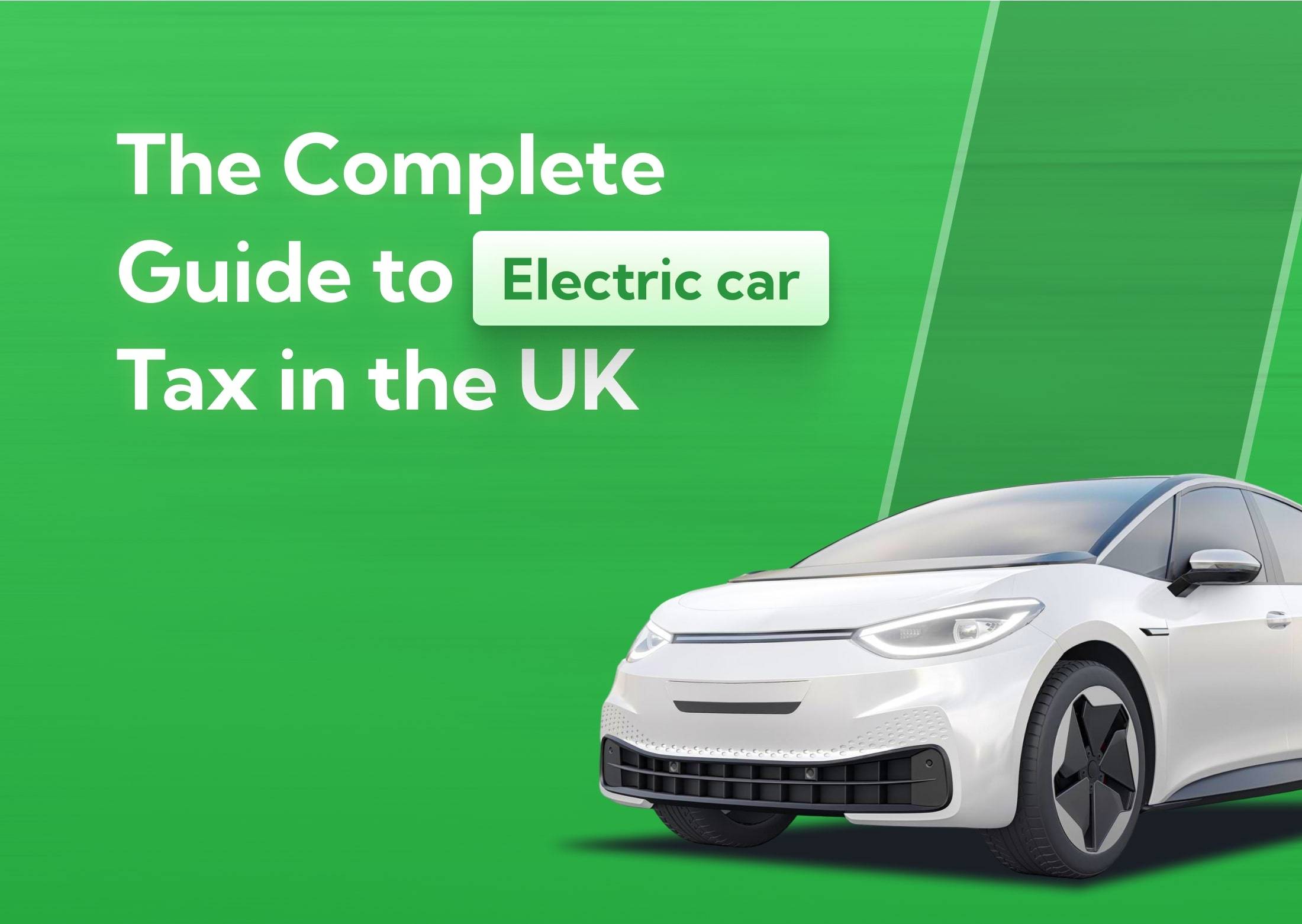The Complete 2025 Guide to Electric Car Tax in the UK
In this guide, we’ll talk about everything you need to know about electric car tax in the UK for 2025. We’ll cover topics like the DVLA electric car tax changes, Rachel Reeves' plans for electric car tax, the HMRC implications and the tax benefits of leasing. We’ll also share a handy link to instantly answer “how much is my car tax?”
Last updated: 23rd October, 2025

Award-winning CEO driving growth and social impact across automotive, recycling, and technology-led enterprise platforms.

Listen to this story
Car tax is a hot topic for drivers, and it’s paid annually to the government. But what for? Well, car tax is used to fund national road projects, including maintenance, road works and construction of new highways. The amount of car tax you pay depends on factors such as when your car was registered, or whether it’s an electric, petrol or diesel engine car.
There’s been a real push towards electric cars as part of net zero and the drive for a more sustainable economy. But if you’ve invested in an EV vehicle, or are thinking of doing so, what does that mean for car tax? Let’s get into it.
What's in this article
- 1. Introduction to Electric Car Tax in the UK
- 2. Key Changes to Electric Car Tax in 2025
- 3. UK Budget Updates on Electric Car Tax
- 4. Rachel Reeves Announcements and Policy Shifts
- 5. Electric Car Road Tax Explained
- 6. Electric Car Tax Rates and Increases
- 7. Pay-Per-Mile Electric Car Tax
- 8. Electric Car Tax Relief and Exemptions
- 9. Business and Company Car Tax Rules for EVs
- 10. Comparing Electric Vehicle Car Tax With Petrol and Diesel
- 11. How to Prepare for the Future of Electric Car Tax
Car tax is a hot topic for drivers, and it’s paid annually to the government. But what for? Well, car tax is used to fund national road projects, including maintenance, road works and construction of new highways. The amount of car tax you pay depends on factors such as when your car was registered, or whether it’s an electric, petrol or diesel engine car.
There’s been a real push towards electric cars as part of net zero and the drive for a more sustainable economy. But if you’ve invested in an EV vehicle, or are thinking of doing so, what does that mean for car tax? Let’s get into it.
Introduction to Electric Car Tax in the UK
Electric vehicles were previously exempt from Vehicle Excise Duty (VED) or road tax. For this reason, they became financially very attractive for British motorists who were keen on their lower running costs and environmentally friendly status.
However, a government change of policy in 2025 brought in sweeping changes via the Autumn Statement. From 1st April of 2025, EVs left a long period of road tax exemption and became subject to Vehicle Excise Duty, like petrol and diesel cars.
Their taxation treatment became more aligned with other road vehicles, making a complete pivot in UK transport policy.
Why did the UK government pivot on EV road tax treatment? Because there was concern over reduced fuel duty revenue and the impact on government taxation receipts.
Key Changes to Electric Car Tax in 2025
These are the main DVLA electric car tax changes that motorists need to know:
DVLA Electric Car Tax Changes
- For electric vehicles registered on or after 1st April 2025, the first-year VED charge is £10.
- After this first year, the VED rate reverts to £195 a year annually. This brings it in line with petrol and diesel cars.
- For vehicles listed at £40,000 when new, there is also a £425 Expensive Car Supplement in years 2-6. This increases the total VED to £620.
- For Electric cars that were registered between 1st April 2017 and 31st March 2025, the flat-rate VED is £195.
- The VED is just £20 a year for old EVS registered before 31 March 2017.
The rules were backdated, meaning that many car owners who hadn’t paid VED in the past (or had done so at a lesser rate) were pulled into the new tax bands.
Where can I check my road tax?
Asking “How much is my car tax?”. If you’re unsure about your car tax, it’s quick and easy to check it for any type of vehicle with our handy car tax checker. Wondering how to tax a car, particularly when you’re selling it? See our quick guide.
UK Budget Updates on Electric Car Tax
The changes to road tax made in the 2022 Autumn statement were led by the Conservative Government, under Jeremy Hunt, the then-Chancellor.
These set out the roadmap to change Vehicle Excise Duty, to ensure EV owners contributed to road tax and to bring a greater degree of fairness to road users, regardless of the car type.
When the Labour Government came into power in 2024, they didn’t reverse the changes, or further adjust them in any way.
Rachel Reeves Announcements and Policy Shifts
As Chancellor in the Labour Government, Rachel Reeves announced that new electric vehicles would pay only £10 for their first year of road tax from April 2025.
Further, the Rachel Reeves electric car tax change would see this low rate maintained for a minimum of five years. However, EVs are still obliged to pay the standard rate of VED from year two onward.
Rachel Reeves and Expensive Car Supplements
Rachel Reeves also stated that the Labour Government were considering a rise in the threshold for Expensive Car Supplements, chargeable at cars listed new for £40,000 and above) to prevent a disproportionate tax burden to EV cars.
This is because EV cars tend to be more expensive than petrol cars. Additionally, Reeves said that the government is keen to encourage more drivers to buy EV vehicles.
Expected Changes by Rachel Reeves
As yet, the Chancellor has not directly stated anything about further electric vehicle road tax changes, including the possibility of a future pay-per-mile car tax.
The Rachel Reeves electric car tax remains in place, with further changes to Benefit-in-Kind taxes levied on EV company cars. On 6th April 2025, these rose to 3% (from 2%), and will rise further to 9% by 2029-30.
Electric Car Road Tax Explained
The change to the long-standing EV exemption caused controversy. This is a quick visual guide to the current VED structure:
This expensive car supplement now replaces earlier exemptions that were in place for higher-cost EV vehicles. It’s now in place uniformly for all vehicles, regardless of whether they’re electric, petrol or diesel.
Note too that electric vans have to pay road tax at different rates from cars.
Electric Car Tax Rates and Increases
See the table above for current Electric Vehicle Tax Rates. But what about expected changes to electric car tax in 2025 and beyond?
As things currently stand, electric vehicle tax rates are due to remain mostly stable. However:
Benefit-in-kind electric car tax rates
Benefit-in-kind rates are also expected to increase in stages to hit 9% by 2029-30.
Electric Car Luxury Tax
The electric car tax, also called the ‘luxury surcharge’, is imposed on EV vehicles worth over £40k at listing. However, it is not levied on higher-value cars registered between 1 Mar 2001 and 31 Mar 2017.
This is because earlier EVs were exempt from the charge. Post-2025, EVs that are listed at £40,000 or above when new are subject to the surcharge. As a result, many EV manufacturers are pricing new EV cars at less than £40k to help drivers avoid it.
As per current rules, the electric car luxury tax remains in place for five years of ownership before it drops in the seventh year of ownership (when most drivers replace their cars).
Pay-Per-Mile Electric Car Tax
Drivers might have heard talk of a pay-per-mile electric car tax. This has been proposed as a possible replacement for lost fuel duty revenue.
Think tanks have mooted the idea of a 6p a mile PPM tax to mitigate the lost tax revenues from reduced fuel duty. However, the UK government says that it isn’t planning to introduce any pay-per-mile road pricing and says it is committed to supporting the EV car market as part of its drive towards a low-carbon economy.
What the experts say

Anthony Sharkey
Electric Car Tax Relief and Exemptions
As with most forms of government taxation, there are various forms of relief and exemption available as follows:
HMRC Electric Car Tax Relief
Although EV vehicles have to pay VED in most instances, they are still more cost-effective than petrol and diesel cars for salary sacrifice schemes.
For electric car tax relief, HMRC offers benefits too. Businesses that invest in a company electric car can benefit from 100% capital allowances in year one. This means the car expenditure can be deducted entirely from profits before tax, offering a significant amount of tax relief in the first year after purchase.
This makes EV vehicles attractive as company cars, which is the government’s objective as part of their net-zero efforts.
VAT, Benefit-in-Kind, and Other Allowances
For EV vehicles, VAT is paid at 20% for public charging stations and 5% for home charging, which is lower than the fuel VAT for petrol and diesel cars.
People in receipt of certain disability benefits can still access certain exemptions.
Long-Term Government Incentives
The government says that it’s keen to encourage more drivers to buy EV cars, which it's doing by offering other types of incentives. For example:
- Some grants are still available for plug-in cars and EV cars, although these have been watered down since the original grant schemes before 2022.
- There are still attractive incentives for businesses that offer EV car purchases as part of salary sacrifice schemes.
- EV cars in London are also currently exempt from paying the Congestion Charge and ULEZ, but these discounts are being phased out in the 2025-2026 tax year.
Business and Company Car Tax Rules for EVs
There are various electric car Business Tax Considerations to be aware of. For example, company car tax (Benefits in Kind) is still low for electric vehicles, but it is rising. From 2025, EV vehicles are subject to an electric car company car tax of 3%, which will rise to 9% by 2029-2030. However, it’s important to note that this is still far less than the 37% applicable to high-emission vehicles.
Electric Car Company Tax Benefits
Employers benefit from lower Class 1A National Insurance Contributions because of the reduced Benefits-in-Kind bill.
Additionally, employers can offer EV vehicles through salary sacrifice schemes that offer tax-efficient and cost-effective incentives for employees. This is a key way of attracting and retaining top talent in a business.
Electric Car Business Tax Considerations
Businesses buying electric vehicles for their fleet can access enhanced capital allowances and reduced company car tax rates. However, the Expensive Car supplement still applies to EVs worth above £40k at the new-vehicle listing price, even when they are business-owned.
Corporation Tax Rules for EV Fleets
Corporation tax relief on EV purchase and operating costs exists, often via first-year or Annual Investment Allowances. However, details vary with fiscal policy and should be confirmed with HMRC guidelines
Electric Car Leasing Tax Benefits
Where employers use salary sacrifice schemes to offer leased EVs, there are options to reclaim the VAT and benefit from lower Benefits-in-Kind taxes. Although the rising rate of BiK taxation slightly reduces these benefits, EV cars still offer more electric car leasing tax benefits than petrol and diesel vehicles.
Comparing Electric Vehicle Car Tax With Petrol and Diesel
Let’s look at how the electric car tax compares to taxation treatments for petrol and diesel vehicles.
Cost Differences for UK Drivers
EVs still usually cost less to tax in 2025, even with the VED exemption having come to an end. For example, if we compare cost differences between EVs and petrol/diesel cars:
- Petrol and diesel vehicles pay Vehicle Excise Duty that starts at £195. However, this figure rises significantly if the car is considered to be high-emission. For example, at over 255g/km, VED in the first year is £2,000.
- For EV’s, the fee is £195 as standard, or £20 if the car is older, as well as the £425 standard for the luxury car category, if this is applicable (vehicles listed at £40k and above as new). This is usually still cheaper than for high-emission vehicles in a similar class.
- Additionally, maintenance, fuel and operational costs in general tend to be lower for EVs, which the government argues offsets the tax increases.
How Policy Shifts May Affect Adoption Rates
There have been fears that the new higher car tax rates for electric vehicles could put buyers off, especially as EV vehicles are typically more expensive to buy upfront, and still suffer from limited charging infrastructure across the UK (including access to home charging.)
However, businesses and fleet markets are seeing sustained levels of investment as incentives such as corporate schemes and salary sacrifice continue to make EV vehicle purchases attractive.
How to Prepare for the Future of Electric Car Tax
In reality, the future of electric car tax is never fully known. Government policies constantly change, and motorists can suddenly face new taxation structures. However, industry analysts provide the following pointers:
What Drivers Should Expect After 2025
Further increases to Benefits-in-Kind taxation and annual Vehicle Excise Duty are already in the pipeline. Drivers will be waiting to see if Rachel Reeves makes any further announcements in the Autumn 2025 budget.
Manufacturers are expected to continue shifting EV pricing strategies to keep as many models under the £40k limit as possible to avoid the surcharge.
Another key issue for EV adoption is the charging infrastructure required nationally. Policies may well evolve to encourage faster adoption of charging stations.
How Businesses Can Adapt Their Fleets
The key here is to plan fleets around rising rates for Benefits in Kind taxation. Businesses should use fleet calculators to accurately assess electric car tax obligations. It’s also sensible to look at leasing strategies or invest in EVs that sit below the £40k surcharge threshold.
Businesses should also maximise available benefits by taking advantage of capital allowances and/or using salary sacrifice schemes.
Policy Outlook for the Next Decade
Frozen fuel duty means significant revenue loss for the government, so it may be that mileage-based taxes or road pricing come online in the future.
The government is still committed to achieving ambitious EV targets, including an 80% ZEV share by 2030 as part of green energy mandates.
Frequently asked questions
EVs usually pay the same standard VED now of £195. However, their first year charge is just £10, and some older EV models still only need to pay £20. Surcharges apply for luxury EVs over £40k.
The Rachel Reeves electric car tax announcement in the last Autumn Budget was the changes to Vehicle Excise Duty for EV’s, and the rising Benefits in Kind taxation for EV’s, increasing to 3% on 6th April 2025 and again to 9% by 2029-30.
Yes, there is a current luxury electric car tax, which means any newly listed £40,000 EV car will pay the Expensive Car Supplement at £425 a year, for years 2-6 of ownership. This means the total VED is £620.
HMRC offers favourable Benefit-in-Kind rates, capital allowances for EVs that are used in businesses or for company cars, and salary sacrifice incentives. These are all designed to increase the uptake of EV vehicles and offset the EV VED to a certain degree.
Yes, through the mechanisms described above. So long as EV vehicles are under £40k each, they are tax-efficient for fleet investment.
Once your car is over 40 years old, it is classed as a historic car and is exempt from car tax. Sadly, that’s unlikely to apply to EV cars, due to the relative newness of EV technology.
Yes, there are still electric car leasing tax benefits in the form of VAT-efficient tax arrangements, and lower Benefit-in-Kind rates.
Not as yet. Though think tanks have proposed implementing a pay-per-mile tax in the future, the government says it has no current plans to do so.
The standard rate of VED is £195. EV’s over £40k have an additional £426 surcharge. By 2029-2030, Benefits-in-Kind rates will rise, incrementally, to 9%.
Yes, EV-specific rates and corporation tax allowances do apply to electric company cars. HMRC provides guidelines about operating tax relief and investment relief.
As of now, the 2025 changes remain in place. EVs are taxed, the surcharge is in place for luxury EVs, but there are still broader incentives.
It does seem likely that the government will need to address the problem of declining fuel duty in the form of future policies, and consider how sustainable EV tax frameworks are if adoption continues to grow, but the impacts of these are yet to be seen.
Our guide covers everything you need to know, including how to cancel car tax when selling your vehicle, and how to change car tax direct debit.
About Car.co.uk

Share on
Latest news & blogs










